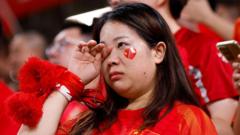On a sweltering Thursday night in Saitama, the dreams of a footballing utopia for China faced a crushing reality. The national team suffered an unprecedented 7-0 defeat against Japan in a World Cup qualifier, marking what many are calling "rock-bottom" for Chinese football. The final blow from Japan's Takefusa Kubo came merely moments before the whistle, sealing China's fate in a fixture that epitomized their struggles on the international stage.
This crushing defeat followed a series of humiliations over the past year, including losses to countries like Oman and Hong Kong. Just a week after that disastrous match, the domestic football scene was shaken further by a corruption scandal that saw many players, coaches, and officials arrested in relation to gambling and match-fixing.
China’s men's team finds itself ranked 90th in the world, a far cry from its aspirations to become a footballing superpower. Years ago, President Xi Jinping launched a bold initiative to revitalize football in China with a vision to qualify for the World Cup, host the event, and win it. However, these ambitions seem to have faded, with Xi himself admitting to "luck" in recent victories.
Historically, the structure of Chinese football has been marred by political interference. Despite high expectations and governmental backing, football's management in China has been notably rigid and top-heavy. As Mark Dreyer, a sports writer based in Beijing, emphasized, decisions are dictated by Communist Party officials rather than football experts, stifling the grassroots development essential for success in competitive sports.
The disconnection between governance and the game itself has crippled the potential for footballing talent to emerge organically. China lacks the robust pyramid structure seen in successful footballing nations, with fewer than 100,000 registered players compared to the 1.3 million in England alone. A disinterest in the sport at a youth level has resulted in a dearth of elite-level players, compounded by the top-down approach that privileges short-term solutions over sustainable development.
Yet, the passion for football remains strong within China. The women's national team, ranked 17th, continues to inspire local fans, but the men's team's repeated failures overshadow these successes. The Chinese Super League enjoyed a brief period of fame but has since witnessed the closure of over 40 clubs during an economic downturn exacerbated by the pandemic. Giants like Guangzhou Evergrande are now also struggling owing to the financial implications of a larger real estate crisis facing the nation.
The football community has been rocked by a wave of corruption revelations, with figures like former national team coach Li Tie admitting to bribery and match-fixing practices. These admissions have fueled public outcry, prompting a complete re-evaluation of the footballing governance within the country.
Despite the national agony of watching the men's team flounder, the response from fans ranges between disappointment and dark humor. Observers note a stark contrast between China's football strategy compared to other nations, particularly Japan, which has invested in long-term planning and grassroots sports initiatives.
As the country grapples with sustained economic challenges and the fallout from corruption, football remains a significant concern for many, straddling the line between immense disappointment and hope for eventual revitalization. The lingering sentiment, however, reflects a profound awareness that real change cannot stem from mere political narrative, but rather requires genuine investment in skill development and community engagement.

















